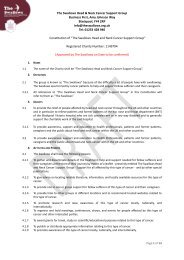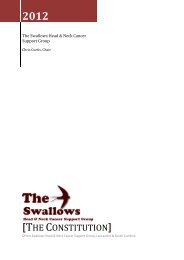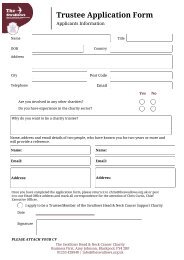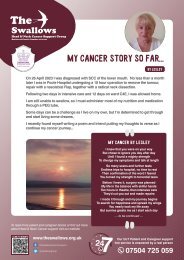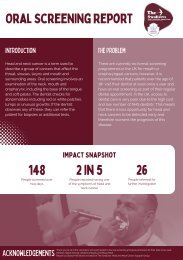2023 Head & Neck Cancer Conference Guide Book
Create successful ePaper yourself
Turn your PDF publications into a flip-book with our unique Google optimized e-Paper software.
Liquid biopsies – can they help us improve head<br />
and neck cancer care? You can help us.<br />
By Ben O’Leary, The Institute of <strong>Cancer</strong> Research and The Royal<br />
Marsden Hospital, London, UK | ben.oleary@icr.ac.uk<br />
One question we get asked a lot in the head and neck oncology clinic after patients<br />
complete their radiotherapy is ‘how do we know if it’s going to come back’? It’s one of<br />
the most important questions for people who have been through radiotherapy, but the<br />
honest answer is that for any given individual we don’t know. It’s because we don’t know<br />
that we see people so regularly even after they have completed their treatment, aiming to<br />
catch any cancer recurrences as quickly as we can.<br />
Those of us who work in<br />
cancer research are trying<br />
to find more accurate and<br />
effective ways of detecting<br />
cancer recurrence. One<br />
promising technology has<br />
been called ‘liquid biopsy’.<br />
All of use have some of our<br />
DNA floating in our blood,<br />
which can we detected when<br />
a blood sample is taken. A<br />
relatively recent discovery is<br />
that in people with cancer, a<br />
small proportion of the DNA<br />
in the blood can be found to<br />
have originated form the<br />
person’s cancer.<br />
Liquid biopsies – Using blood tests to detect cancer.<br />
Created with biorender.com<br />
This means that it might be possible to develop a blood test designed to detect cancer<br />
recurrence. The available evidence suggests that this could indeed be possible, although<br />
at present difficult and expensive to do. We could potentially use a test like this to help<br />
improve cancer detection in people who we have treated with radiotherapy.<br />
Even though it is possible to develop liquid biopsy tests like this, what is not clear currently<br />
is whether they are useful and provide benefit for patients. Detecting cancer recurrences<br />
early could allow earlier treatment, which might improve how people feel or how long<br />
they live. However, we don’t know this is the case, and it may be that such a test just<br />
introduces additional burdens for patients in terms of inconvenience and anxiety, without<br />
helping them feel better or live longer. It often feels logical that more medical testing<br />
should produce better results for patients, but research has shown this is often not the<br />
case. Given the expense and the complexity of these liquid biopsies, it is important to<br />
properly understand if they can really help people before we start using them routinely.<br />
The Swallows charity, working with colleagues in Edinburgh, has previously sent round a<br />
survey asking people how they feel about some of these issues. Broadly, people liked the<br />
idea of such a test, but felt it was important that the test be done with some treatment<br />
in mind – not just to find out about recurrence, but to find out and then do something<br />
about it.<br />
We are now developing a clinical trial to see if using liquid biopsies can improve treatment<br />
for people with head and neck cancer. We want to take blood tests for liquid biopsies<br />
32 HEAD & NECK CANCER CONFERENCE <strong>2023</strong><br />
from people after they have finished their radiotherapy for head and neck cancer and<br />
test them for cancer recurrence, giving them treatment based on the result, rather than<br />
waiting for the patient or their doctors to notice the cancer coming back.<br />
An important part of clinical trials is comparison. If you want to try something new you<br />
need to compare it to what you would have done normally to see if it is better. Without a<br />
proper comparison you will never really know. The best way to get a fair comparison is to<br />
randomly decide whether people get the usual treatment or the trial treatment – doctors<br />
or patients can’t choose.<br />
For our trial, this means randomly deciding whether patients and their doctors get the<br />
liquid biopsy tests, or whether they don’t. At the end of the trial, we will see whether people<br />
who, along with their doctors, were given the liquid biopsy information felt better and lived<br />
longer, or whether they were just more inconvenienced and anxious, without living longer.<br />
Communicating these ideas, along with the possible risks and benefits is hard to do well,<br />
but so important to connect with people for whom this really matters – patients with head<br />
and neck cancer and their families, friends, and carers. We would like your help so we can<br />
do this better.<br />
We work with an expert group of patients who we ask to help us with our research plans. They<br />
flagged the following issues as important which I have tried to explain a bit about already:<br />
1. Explaining why it was necessary to randomly decide whether a patient and their<br />
team was informed or not of the liquid biopsy results.<br />
2. Being clear that the trial would mean extra tests, which could be more<br />
inconvenient and lead to worry about results.<br />
3. If the trial showed the liquid biopsy test made a difference, being able to share<br />
results with the people who had been randomly allocated the usual treatment.<br />
We believe it is really important to get as many views on this trial as possible and we would<br />
be very grateful for your help with this. It is harder than ever to get research funding for<br />
clinical trials, and showing that a trial is supported by patients can make a real difference.<br />
If you have any views on this trial, supportive or not, we would very much like to hear from<br />
you, even if just to say you are supportive, or would be interested in hearing more. You can<br />
email me on ben.oleary@icr.ac.uk.<br />
Clinical trial design – People in the trial all have blood tests after they complete<br />
their radiotherapy for head and neck cancer. Half of patients have their blood tests<br />
analysed for cancer DNA and the patients and their doctors are told the results –<br />
this is decided randomly. The other half have follow up as normal with their blood<br />
tests only analysed when the trial finishes. Created with biorender.com.<br />
#HNCCONF<strong>2023</strong> 33<br />
>




